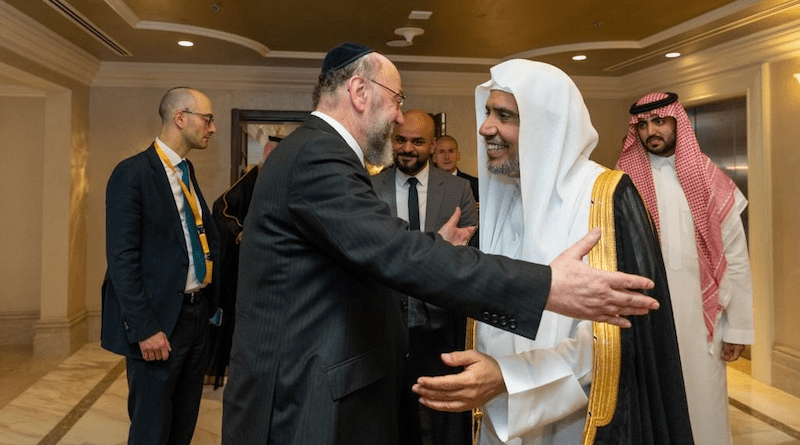UK’s Chief Rabbi And The Abraham Accords – OpEd
The 9th annual assembly of the Abu Dhabi Peace Forum was held this year in the United Arab Emirates (UAE) from November 8–10. Founded in 2014 as a Forum for the Promotion of Peace in Muslim Societies, its original purpose was “to serve as a space for the discussion of humanitarian problems and intellectual and religious conflicts in Muslim societies.” Last year its remit was broadened and its title amended to embrace issues of global concern. With a variety of armed conflicts raging across the world, more than 100 million displaced refugees, and growing food and energy shortages, this year’s assembly met to discuss “Global Conflict and Universal Peace: Urgent Needs and Opportunities for Partnership”.
It brought together religious leaders, politicians, officials, representatives of national and international organizations, and peace activists – in all some 500 participants from 60 countries. Among them, making the occasion unique and historic, was Rabbi Ephraim Mirvis, Chief Rabbi of the United Hebrew Congregations of Great Britain and the Commonwealth, to give him his full official title.
Britain’s first Chief Rabbi was appointed in 1704. In all the subsequent 318 years, no holder of that office has ever paid an official visit to an Arab country – until November 8 this year. That was the day Mirvis arrived in the UAE and addressed the Abu Dhabi Peace forum. In scenes that would have been unbelievable, indeed impossible, only a couple of years before, Rabbi Mirvis had been greeted by the Forum’s founder and president, Sheikh Abdullah bin Bayyah, one of the world’s most revered Islamic scholars, and was accorded a seat next to him in the sumptuously furnished ballroom of Abu Dhabi’s Ritz Carlton.
Mirvis greeted the attendees with the words “Salam aleikum, shalom aleichem.” and then, in a mixture of Hebrew, Arabic and English, he called on leaders of all faiths to build on the historic peace brought about by the Abraham Accords, signed two years before.
“I am only standing here before you thanks to the courage of great and outstanding leaders who have reached for the stars,” he said.
The Abraham Accords are, of course, primarily an expression of political, economic and security pragmatism – a recognition of the benefits for the signatories and the region as a whole that flow from cooperation rather than indifference and a failure to engage. Normalization of relations with Israel did not involve the Arab states in renouncing deeply held views on the Israel-Palestinian dispute, but they agreed that resolving that long-standing problem was not a necessary pre-requisite.
Mirvis has taken the Abraham Accords at their word, as it were. He has used the rationale behind its title – namely the common Abrahamic basis for Judaism, Christianity and Islam – as the basis for a plea to strengthen tolerance and understanding between those faiths and their followers, and indeed between all faiths.
He told his audience that it was thanks to the Accords that he was able to visit the UAE and speak in an official capacity, but also that the Accords had opened a “window of opportunity” to strengthen Jewish-Muslim relations.” He urged his audience to remember the common thread linking their faiths – namely Abraham. “All of us here are children of Abraham, our father.”
In an interview before setting out for the UAE, Mirvis revealed that many of his meetings with religious leaders around the world on interfaith cooperation and understanding happen only “on condition of secrecy”, and even then are cancelled at the last minute. The result of secret meetings, he said, is that “it doesn’t make an impact because it stays among the faith leaders at the top of that pyramid and it just doesn’t filter down.” But that is changing, he believes. “We are now seeing, gradually, more and more faith leaders come out into the open.”
Mirvis also made this point at the Forum. He said more needed to be done to bring people together at a grassroots level. “Where we are up to is not good enough. We have harmony between faith leaders but it has to filter down. It is good and pleasant for brothers to sit together in peace in this hall, but we want this to happen between all Jews and all Muslims and all Christians.”
Ari Gordon, US director of Muslim-Jewish relations at the American Jewish Committee, described the Chief Rabbi’s appearance at the Peace Forum as a “watershed moment. It was moving to see the warm greeting Chief Rabbi Mirvis received from Sheikh Bin Bayyah, and even more so the enthusiastic applause from hundreds of Muslim scholars upon hearing his call from Jewish tradition for cooperation across lines of faith. For the Jewish delegates, his voice on the main stage was ennobling, and for those who have little exposure to Jews or Judaism it opens a path to learn more and to correct misconceptions.”
By attending the Peace Forum, and by extending a hand of friendship, tolerance and understanding to the Muslim faith leaders and others at the gathering, Chief Rabbi Mirvis very specifically associated his presence and his message to the ground-breaking political achievement represented by the Accords. He has demonstrated that the Abraham Accords have religious and social possibilities not initially apparent, and has taken a global lead in a bid to exploit them. His initiative is surely to be commended.

